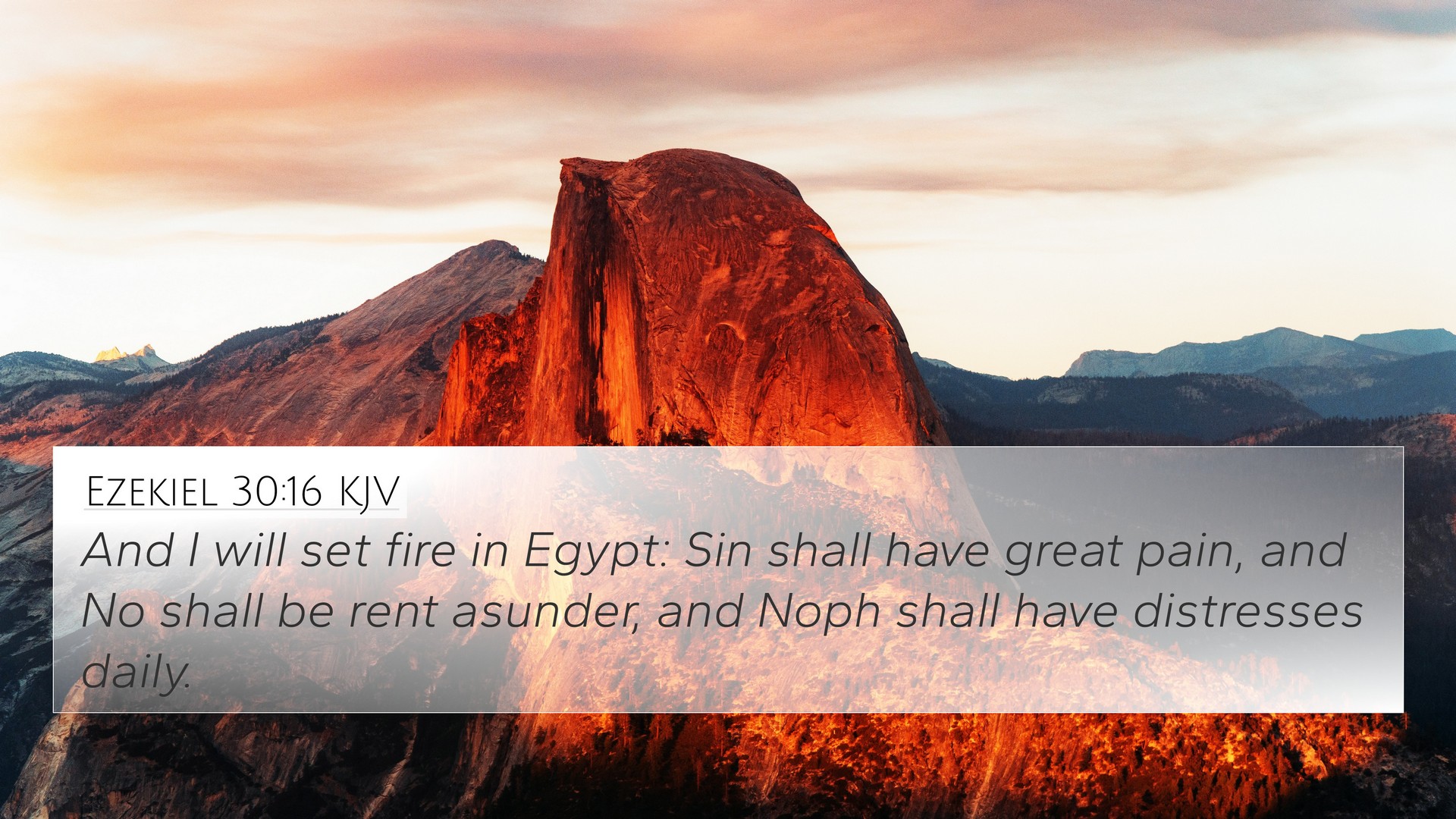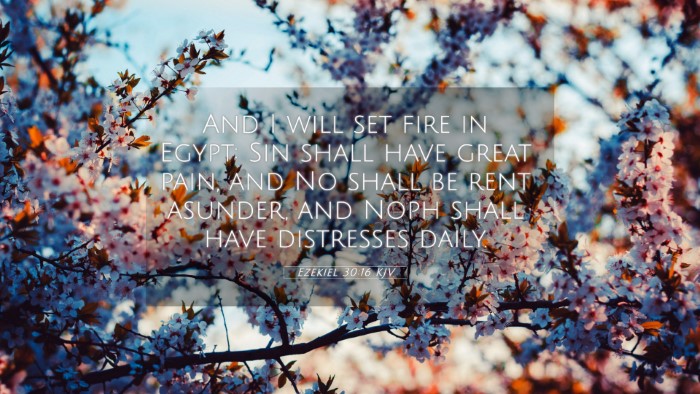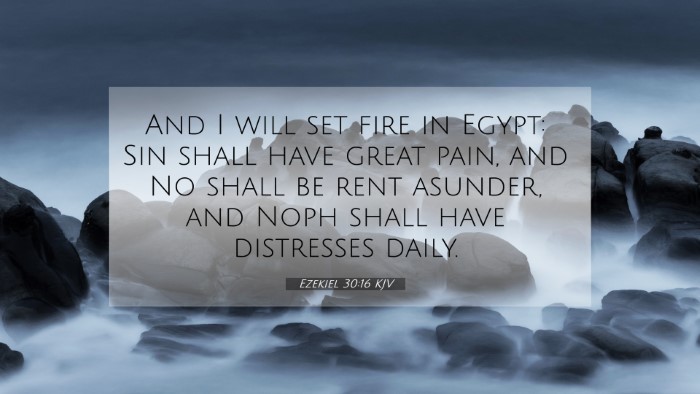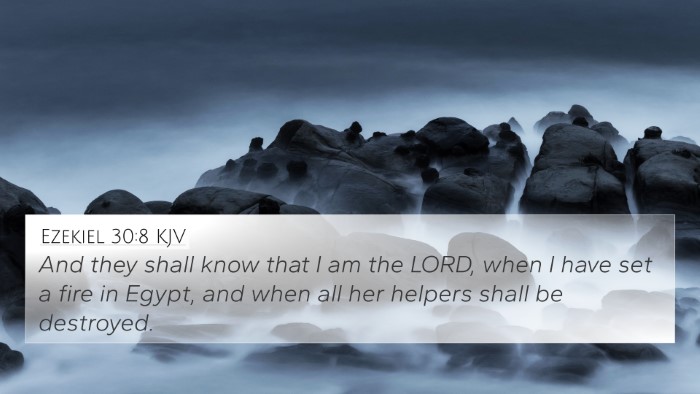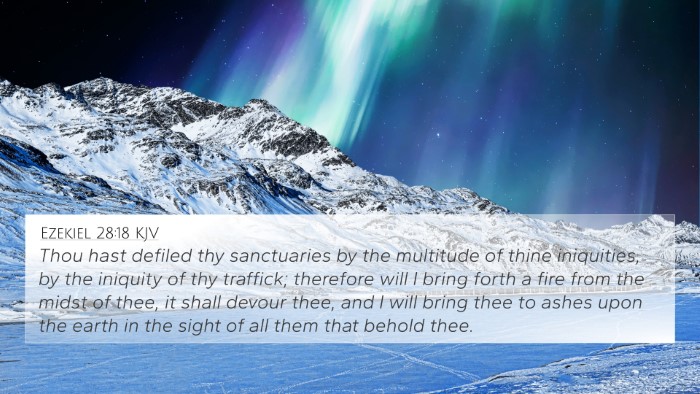Understanding Ezekiel 30:16: Insights and Analysis
Ezekiel 30:16 states: "And I will set a fire in Egypt; Sin shall have great pain, and No shall be broken up: and Noph shall have distresses daily."
Summary of the Verse
In this verse, God proclaims His judgment upon Egypt, highlighting three significant cities: Sin (Pelusium), No (Thebes), and Noph (Memphis). The imagery of fire signifies destruction and calamity, reinforcing the severity of God's pronouncement.
Commentary Insights
Matthew Henry’s Commentary
Henry emphasizes the certainty of God's judgments and the consequences that would befall Egypt. He notes that Sin symbolizes the pagan cities that turned their backs on God, leading to their inevitable downfall. The mention of widespread distress indicates not just physical destruction but also spiritual desolation.
Albert Barnes’ Notes
Barnes elaborates on the cities mentioned in this verse, noting that No signifies a once-glorious metropolis that would face collapse and mourning. He draws connections to the historical context during the Babylonian conquests, demonstrating that this prophecy was a warning of impending doom.
Adam Clarke’s Commentary
Clarke reflects on the poetic nature of the prophetic language used by Ezekiel. He suggests that the term Noph, often connected with idols, alludes to the idolatry rampant among Egyptians. Clarke emphasizes God's power in bringing nations to their knees, effectively showcasing God's sovereignty over all creation.
Thematic Connections
This verse highlights several thematic connections within the Bible, including:
- Divine Judgment: The concept of divine judgment on nations is a recurring theme, illustrated also in Jeremiah 46:25.
- Idolatry: There is a continuous warning against idolatry, found in Isaiah 19:1-3, where Egypt's idols cannot save them from God's wrath.
- Desolation: The motif of desolation appears in Revelation 16:19, where cities face destruction due to rebellion against God.
- Prophetic Urgency: Similar urgency in prophetic messages can be seen in Jeremiah 1:10, where God appoints prophets to uproot and tear down nations.
- Historical Context: Cross-referencing with Ezekiel 29:1-12 provides insight into the specific historical backdrop of Ezekiel's prophecy.
- Restoration Promises: There's a shift towards hope in Ezekiel 37:11-14, where dry bones come back to life symbolizing future restoration.
- Covenantal Faithfulness: The theme of covenant in Jeremiah 31:31-34 reflects God's commitment to His people, even amidst judgment.
- Role of the Nations: You can see the interconnectedness in nations' destinies in Isaiah 40:15, where God’s sovereign judgment spans across peoples.
- Mourning for the Fallen: Lamentations 1:1 echoes the sorrow of desolation similar to the mourning for Egypt's fall.
- Hope Amidst Judgment: The eventual restoration reflected in Joel 2:25-27 where God promises to restore what was lost resonates in the face of judgment warfare.
Cross-Referencing Biblical Texts
To dive deeper into the meaning of Ezekiel 30:16, it is beneficial to explore the following related verses:
- Exodus 20:3-5: Idolatry as a violation of God's commandments.
- Isaiah 19:1: Egyptian idols falling before God’s might.
- Ezekiel 29:6-7: A warning to Egypt about the consequences of their actions.
- Jeremiah 46:24: A similar proclamation against Egypt during their judgment.
- Revelation 18:2: The great city Babylon's fall symbolizes God's ultimate judgment.
Practical Application for Study
As one engages with cross-referencing Biblical texts, it can enrich understanding. Here are some tools and methods for exploring these connections:
- Bible Concordance: A useful tool to identify thematic verse connections.
- Comparative Bible Study: Finding nuances between prophetic writings across the Old and New Testaments enhances understanding.
- Cross-reference Guides: Utilize guides to explore thematic connections across scripture.
- Bible Chain References: Following character or thematic chains can unveil interwoven biblical narratives.
Conclusion
Ezekiel 30:16 serves as a poignant reminder of God's sovereignty and the seriousness of idolatry. By examining the connections between this verse and others, we can appreciate the holistic message woven through scripture. Engaging with various commentaries can further deepen understanding, leading to profound insights about God's plans for nations and individuals alike.
